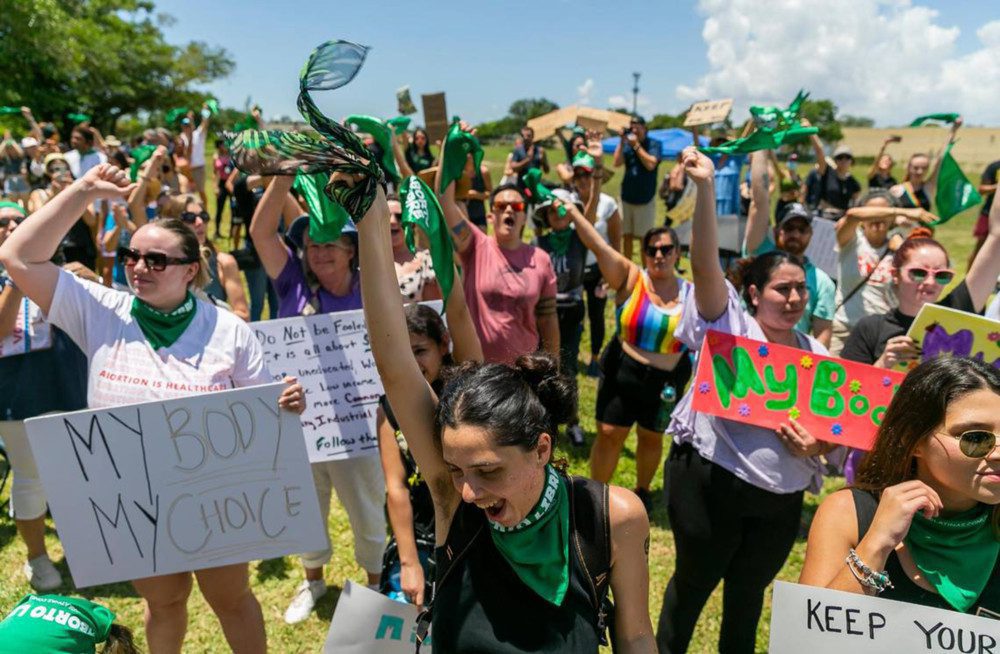Carol Marbin Miller
Miami Herald
WWR Article Summary (tl;dr) As Carol Marbin Miller reports, “Jane Doe 22-B, a 16-year-old in the care of Florida child welfare authorities, told a Florida judge she was “not ready to have a baby,” and sought a court order granting her permission to terminate a 10-week pregnancy.”
Miami
The judge ruled that Jane, as she’s identified in court papers, was not “sufficiently mature to decide whether to terminate her pregnancy.” An order from an appeals court potentially will require the teen to become a mother instead.
Jane is parentless. A ruling this week by the 1st District Court of Appeal in the Panhandle said she lives with a relative and is overseen by an appointed guardian.
About 10 weeks into her pregnancy, Jane sought a judge’s order approving an abortion under a state law restricting the rights of minors to the procedure. Jane’s guardian, who is not named, agreed with the teen’s decision, the order says. The order she sought is called a “judicial bypass.” Such orders generally involve minors who are reluctant to seek parental permission.
Escambia Circuit Judge Jennifer J. Frydrychowicz rejected Jane’s request. The order offers little detail regarding Frydrychowicz’s decision, except to say the judge believed Jane lacked the maturity — a requirement under the statute — to choose an abortion.
Jane’s plight comes amid seismic changes nationwide in the battle over women’s rights to abortion — or even contraception.
In June, the U.S. Supreme Court reversed the landmark Roe v. Wade decision by a 6-3 vote. The court’s ruling set the stage for a flurry of legislative activity across the United States, as lawmakers in mostly Republican-controlled states began chipping away — and in some cases eliminating — abortion rights.
One Supreme Court justice, Clarence Thomas, suggested the court should consider allowing states to restrict other rights that rested upon the same privacy foundation as the Roe decision, including the right to same-sex marriage.
The order by a three-judge panel of the 1st District Court of Appeal in Pensacola was signed by judges Harvey L. Jay III, Rachel E. Nordby and Scott Makar.
The Department of Children & Families, in whose care Jane apparently remains until her 18th birthday, did not respond to a request for comment by the Miami Herald.
“What’s so upsetting about this case is that the minor seeking an abortion is nearly 17 years old, parentless and has suffered trauma,” said retired Miami-Dade child welfare judge Jeri B. Cohen. “She now risks retraumatization by being forced to give birth to a child that she neither wants nor can afford.”
Both Frydrychowicz’s original order, and the appeals court’s affirmation of it, leave Jane an off-ramp. Jane may return to Frydrychowicz’s court again and ask the judge to reconsider her ruling. But under Florida’s statutory scheme, Jane will be barred from having the procedure in Florida when the pregnancy reaches 15 weeks.
If Jane is permitted to leave the state — which is uncertain given the lack of clarity over her status as a ward of the state — she likely will be unable to terminate the pregnancy through use of medication. She would then require a surgical procedure, said Cohen, who had helped found the Women’s Emergency Network earlier in her career to raise money for women with unwanted pregnancies.
Because the records of Jane’s case appear to be sealed, little is known about the girl, who is just shy of her 17th birthday. The appeals court decision said “she is pursuing a GED with involvement in a program designed to assist young women who have experienced trauma in their lives by providing educational support and counseling.”
Complicating the ordeal, the order said, was the recent death of one of Jane’s friends. In a separate opinion, Judge Scott Makar wrote that “reading between the lines, it appears that the trial court wanted to give the minor, who was under extra stress due to a friend’s death, additional time to express a keener understanding of the consequences of terminating a pregnancy.”
“This makes some sense given that the minor, at least at one point, says she was open to having a child, but later changed her view after considering her inability to care for a child in her current station in life,” Makar added.
In her ruling, Frydrychowicz described Jane as “credible” and forthcoming when they met in the judge’s chambers to discuss the procedure. The judge wrote that Jane “showed, at times, that she is stable and mature enough to make this decision.” And, according to Makar, who read the transcript of the hearing, Jane researched her options, obtained information at a clinic, and sought to understand the consequences of terminating her pregnancy.
“The trial court noted that the minor “acknowledges she is not ready for the emotional, physical, or financial responsibility of raising a child” and “has valid concerns about her ability to raise a child,” Makar wrote.
Frydrychowicz ruled against the teen, writing that Jane’s “evaluation of the benefits and consequences of her decision is wanting.”
The judge wrote in her order, however, that Jane “may be able, at a later date, to adequately articulate her request, and the Court may re-evaluate its decision at that time,” Makar wrote in his opinion.
———
©2022 Miami Herald. Visit at miamiherald.com. Distributed by Tribune Content Agency, LLC.












































































































































































































































































































































































